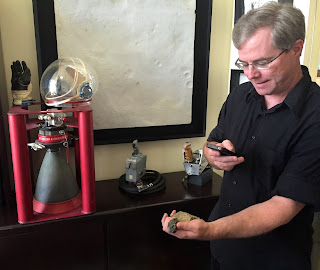Presumed dead after a fierce storm leaves him stranded on Mars, Astronaut Mark Watney survives by sheer courage and wit. He deals with feelings of loneliness and hopelessness by being productive and recording a journal. It is inspiring to see his resourcefulness in using his scientific knowledge for practical needs (such as eating and breathing), the emergencies that arise, and to communicate to NASA that he is still alive. Screenwriter Drew Goddard worked with Author Andy Weir and the production team to stay as true as possible to the science in Weir's fascinating, engrossing book, THE MARTIAN.
Script Doctor Howard Allen shared some thoughts on collaboration with the Institute for Collaborative Storytelling:
While we are talking collaboration, look at what happened with THE MARTIAN, in which Neil Turitz at SSN says, "Drew Goddard took a dense, at times overly scientific, self-published book by first-time author Andy Weir and turned it into one of the most entertaining, dramatic, humorous, emotional and thrilling times at the movies this year." [Editorial note: The Martian was actually Weir's first novel, he previously attracted international attention for his short story, "The Egg."] And then quotes the screenwriter, “The book was challenging, because it’s mostly diary entries describing science experiments,” Goddard admitted (unwittingly further pushing his own cause for a large, gold trophy), “That’s not the first thing you think of when you think of what will work on the big screen. But, as I rocked through the book, what I kept coming back to was, How do I capture the soul of the book and get it into a form we can shoot? How do we step back and convey the science?” Goddard came up with the device of having Watney, (played winningly by Matt Damon) use video diaries to explain what he’s doing, how he’s doing it – all with a disarming and self-effacing sense of humor.
 |
| THE MARTIAN author Andy Weir with Mars Rock |
Of course, as any writer knows, part of the process involves killing your babies. Or, in this case, someone else’s. Goddard admitted that it broke his heart to lose an enormous chunk of the book’s second half: on screen Watney’s month-long, 3200 kilometer journey to the spot where he’ll finally be able to leave Mars takes just a few minutes and culminates in a fun montage scored to the sounds of Abba’s “Waterloo.” On the page, however, it’s close to 100 pages of one problem to be solved after another, and is riveting. These are the decisions to be made, however, and one has to be tough about them."
The world is changing for Story in films. Even before the script is completed, filmmakers are working with scientists and designers on a mash up of stories from fiction and non-fiction sources. Matt Damon, who stars as NASA Astronaut Mark Watney, was brought in before the script was finished to work with Ridley Scott and Drew Goddard on how best to tell a story that crosscut between Mars and Earth and the rescue ship and flashbacks.
 |
| NASA Astronaut Drew Feustel, left, Actor Matt Damon, and Mars Science Lab Project Manager Jim Erickson, |
So Astronaut Mark Watney wasn’t exactly alone on the Red Planet. He had screenwriter Drew Goddard, author Andy Weir, the whole production team and NASA scientists to bring him home.
Oscar news: THE MARTIAN, directed by Ridley Scott, is nominated for Best Picture, Actor in a Leading Role, Production Design, Sound Editing, Sound Mixing, Visual Effects, and Adapted Screenplay.
Oscar news: THE MARTIAN, directed by Ridley Scott, is nominated for Best Picture, Actor in a Leading Role, Production Design, Sound Editing, Sound Mixing, Visual Effects, and Adapted Screenplay.


1 comment:
I greatly enjoyed seeing The Martian in theaters. I'm glad SciFi is finally making its way back on screens to tell gripping human stories, not just rampaging aliens. However, the book was far better. While Drew Goddard is taking credit for making a book full of "diary entries describing science experiments" and turning it into an exciting movie, in reality, the book was highly entertaining and riveting and fascinating - even for people who don't have a scientific background. Goddard made Watney more of a badass than he is in the book, cut out a lot of the trials and tribulations that Watney went through, made the mission commander look weaker than she was in the book, and added some totally ridiculous things that never happened in the book. So, in reality, Drew Goddard turned a terrific book into a typical big budget action film. Entertaining, but lacking the depth and realistic suspense of the novel.
Post a Comment